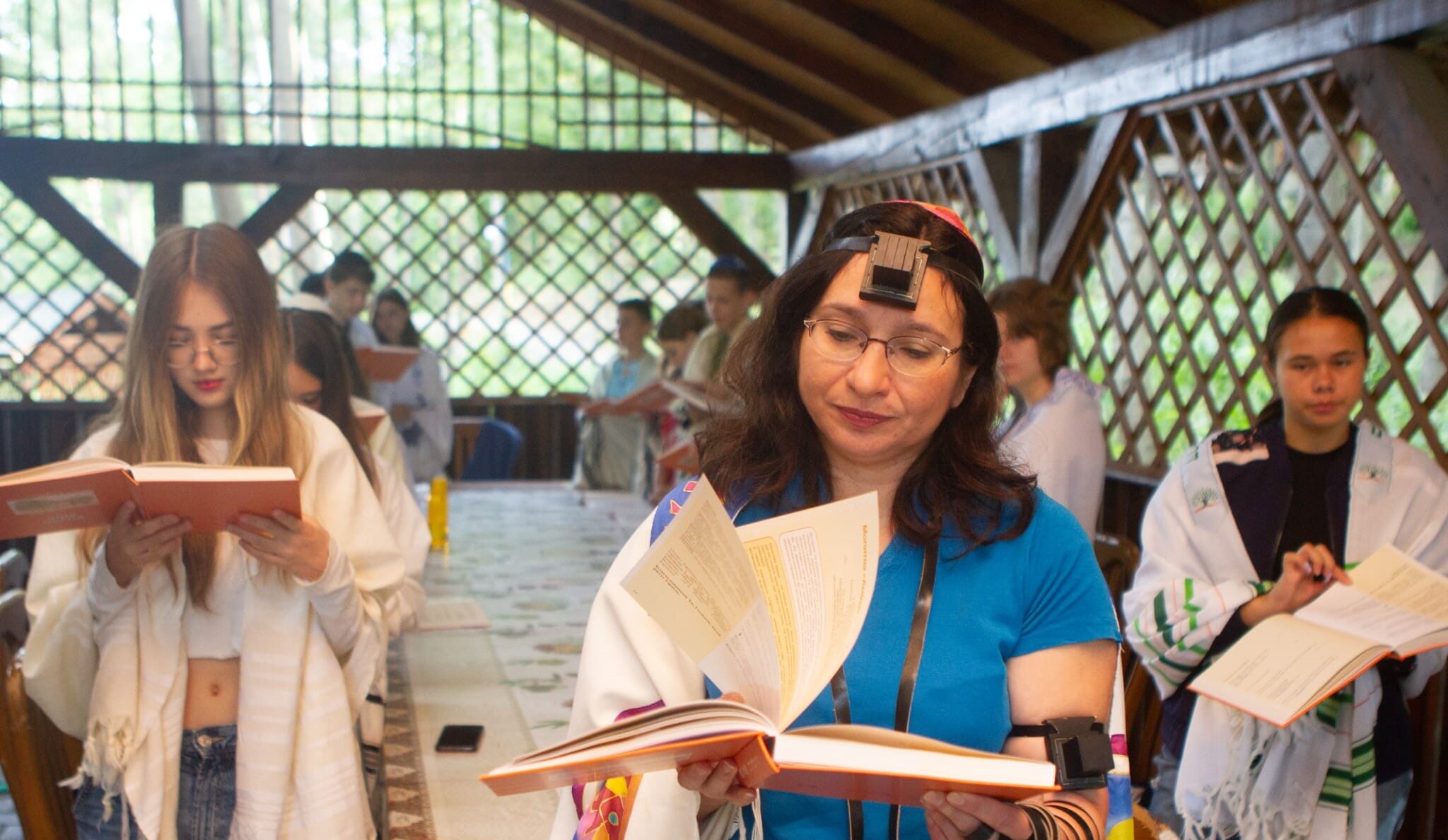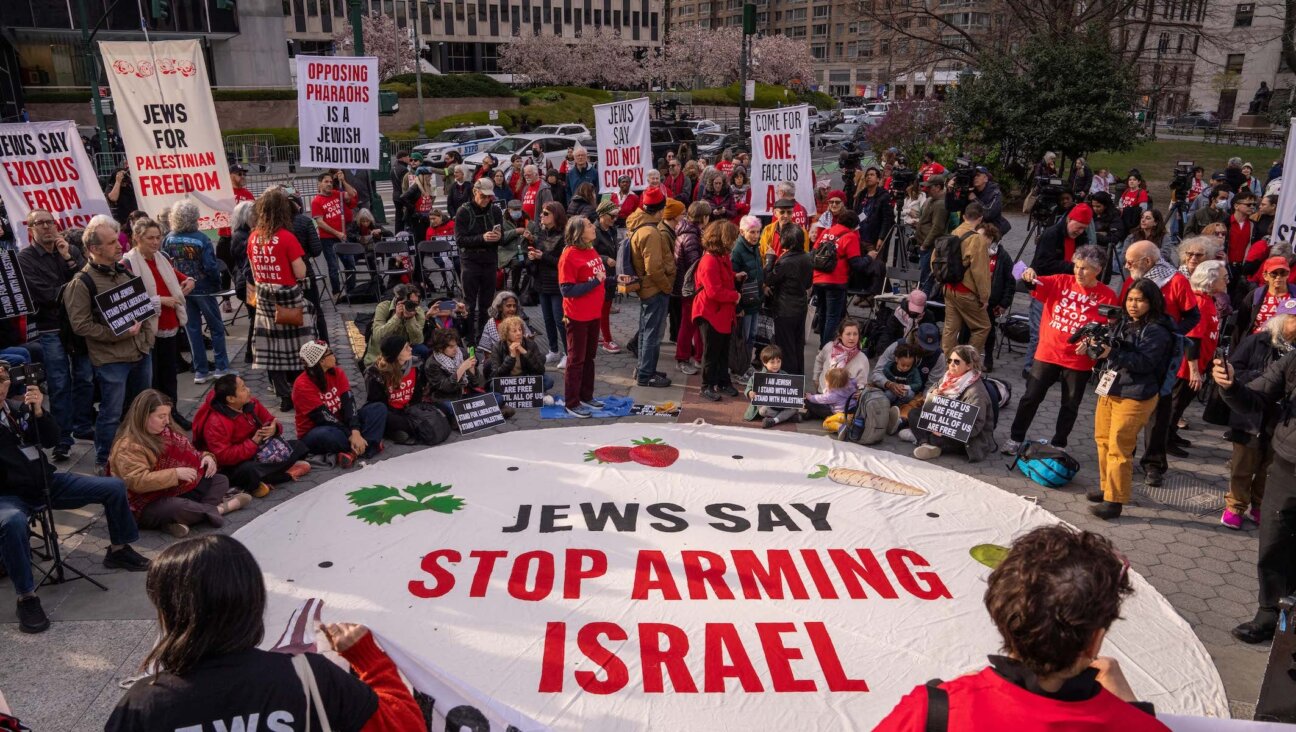Isolated on the anniversary of the Russia-Ukraine war, Ukrainian Jews translate their prayers
The translation efforts are maturing just as President Donald Trump abandons U.S. support for Ukraine

Rabbi Irena Gritsevskaya leads prayers from a new Ukrainian-language siddur. (Courtesy Midreshet Schechter, TALI, Masorti Olami)
(JTA) — As Ukraine’s Jews face a future awash in uncertainty, some are turning to a realm they can control — the language and rituals that define their identity.
Rabbi Irina Gritsevskaya, who leads the Masorti movement in Ukraine, published the first Ukrainian translation of a children’s prayer book in January. Titled “Singing of the Heart” in English, the book is replete with illustrations, questions for children and explanations of prayers. The last page is a prayer for peace in Ukraine.
For centuries, as Ukraine was controlled by the Russian Empire and then the Soviet Union, Ukrainian Jews read prayers only in Hebrew and Russian. But since Russia’s invasion in 2022, many have pushed to translate their sacred texts into their national language, a way of fighting for their identity as both Jews and Ukrainians.
The third anniversary of the invasion on Monday marks a new era in Europe’s bloodiest conflict since World War II. President Donald Trump has rapidly flipped years of U.S. support for Ukraine, verbally attacking Ukrainian President Volodymyr Zelensky while starting talks with Russia about ending the war.
Ukraine was not invited to negotiations in Riyadh last week, and Trump is pressuring Zelensky to sign away 50% of the revenues from his country’s mineral resources, without any clear security guarantees in return. On Monday, the United States was among a handful of countries to vote against a United Nations resolution condemning Russia’s invasion of Ukraine. (Israel, which has long tried to maintain relations with both Russia and Ukraine, also voted against.)
On Saturday night, Russia launched the largest drone attack of the war on Ukraine. For many Jews sheltering from these attacks, Gritsevskaya said, prayer does not just belong in the synagogue — it can be a refuge when they have nowhere to hide and no sense that that help is on the way.
“That’s the main thing that we have right now, our prayers,” said Gritsevskaya, who is based in Israel but travels to Ukraine frequently. “In Ukraine, people feel very lonely in this fight right now. And prayers, that’s the place where you go when other things fail you.”
Inna Vdovychenko provides humanitarian aid to Jews in Odesa through the American Jewish Joint Distribution Committee, or JDC. Last week, a mass drone attack on Odesa knocked out power, leaving some 90,000 people in the dark and shutting off their heating as temperatures fell below 20 degrees Fahrenheit. Two Jews had their doors and windows blown out, said Vdovychenko.
She works to meet the community’s basic needs, such as evacuations from the most dangerous areas, deliveries of food, medicine and other crucial supplies and help surviving the harsh winters and searing summers without electricity. But she said that people also need “food for the soul” — a place to gather for Shabbat, a kitchen to bake challahs, a group to join in cleaning the local Jewish cemetery.
Odesa is a historically Jewish city, home to movements like the Jewish Enlightenment and modern Hebrew literature. On the eve of World War II, every third person in Odesa was Jewish. Today, after the Holocaust and decades under a Soviet regime that repressed Jewish identity, the city’s Jewish population is estimated at about 1%.
As Ukrainian Jews are once again internally displaced by war, many feel it’s especially important to connect with the Jewish community wherever they are, said Vdovychenko.
Russian is traditionally the dominant language of Odesa, as in many other parts of Ukraine. But over the last three years, many Jewish and non-Jewish Ukrainians have switched to Ukrainian. A poll from the sociological group Rating found that 28% of Ukrainians said they exclusively spoke Russian at home in late 2021. By 2024, that number fell to 12%.
“We’ve never spoken Ukrainian a lot here, except for those who would come here to study or commute here for a job,” said Vdovychenko. “Now, I talk to our young people — they switched to Ukrainian. They think that this is their identity.”
The Russian language’s grip over Jewish life in Ukraine has deep historical roots. In the 19th century Russian Empire, Jews living in present-day Ukraine typically spoke Yiddish and Russian. Ukrainian was perceived as a peasant language, neither associated with high culture nor conferring economic advantages. After the Holocaust, Yiddish declined and Russian became the language of the Soviet Union.
Now, Gritsevskaya’s prayer book, or siddur, joins a wave of other efforts to translate Jewish texts into Ukrainian. On Passover in 2023, Ukrainian Jews could read the Haggadah — the holiday’s core text — in Ukrainian for the first time. Thousands of Ukrainian copies of Tehillim, the Hebrew Book of Psalms, are also in circulation. Volunteers have delivered palm-sized copies to Jewish soldiers on the front lines, along with food, generators and protective gear.
Meanwhile, translators are drafting the first Ukrainian translation of the Torah, expected to be printed later this year.
Russia’s invasion, launched with President Vladimir Putin’s claims that Ukrainians and Russians are “one people,” had the opposite effect of strengthening Ukrainians’ national identity. It had the same effect on the identity of many Jews — especially after Putin said he aimed to “denazify” Ukraine, according to Mark Levin, head of the National Coalition Supporting Eurasian Jewry.
“Ukrainian Jews were looking around saying, ‘Wait a minute, we have a Jewish president. We’ve had a Jewish prime minister. There was a Jewish defense minister,’” said Levin. “When Putin and other Russian government officials question Zelensky’s Jewishness, in a sense, they’re questioning the Jewishness of all Ukrainian Jews.”
Shifting to the Ukrainian language is easiest for the youngest among Ukraine’s Jews. When Gritsevskaya introduced the children’s siddur in her Jewish educational camps, she said the counselors wept with pride. But for the children, farther removed from Soviet rule and the pressures of the Russian language, it was natural to see their prayers in Ukrainian.
“With the children, it’s definitely much easier for them to use the Ukrainian language and Ukrainian text,” said Gritsevskaya. “It’s something that they can read by themselves and relate to, which makes it very important.”














